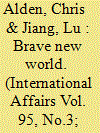| Srl | Item |
| 1 |
ID:
167115


|
|
|
|
|
| Summary/Abstract |
China's ties with Africa are evolving into a multi-faceted relationship of increasing complexity. After nearly two decades of debt-financed infrastructure development, Beijing's exposure to African debt is reaching disquieting proportions with an estimated US$132 billion owed to China in 2016. Managing this new role as Africa's creditor poses uncomfortable questions for creditor and debtor alike. Concurrently, the quiet surge of Chinese investment in manufacturing in Africa is transforming local economies in ways that are beginning to alter the continent's position within the global economy. Finally, the proliferation of Chinese businesses and migrants across Africa is inspiring greater Chinese involvement in UN peacekeeping and private security initiatives.
|
|
|
|
|
|
|
|
|
|
|
|
|
|
|
|
| 2 |
ID:
171399


|
|
|
|
|
| Summary/Abstract |
Energy poverty has become one of the major challenges faced by the world's energy system. However, there is no consensus on the measure of energy poverty. Several approaches have been proposed, among which the energy poverty line has been defined as the minimum quantity of energy required for basic life, particularly for cooking and heating. This paper estimates the relationship between energy expenditure and household income and identifies the energy poverty line based on the threshold above which the energy share becomes insensitive to household income using household survey data from rural Qinghai, China. Considering the ongoing energy transition and the negative impacts of biomass energy consumption for the environment and health, the study sets a scenario in which all bioenergy consumption is replaced with electricity. The findings show that 57% of rural households in rural Qinghai are energy poor. The phase of energy poverty in terms of basic energy access has passed, so increasing the share of efficient modern energy in household energy consumption requires more attention. Considering the existence of a population that is not income poor but is energy poor, a conventional policy design that primarily targets income-poor households may be inappropriate in this case.
|
|
|
|
|
|
|
|
|
|
|
|
|
|
|
|